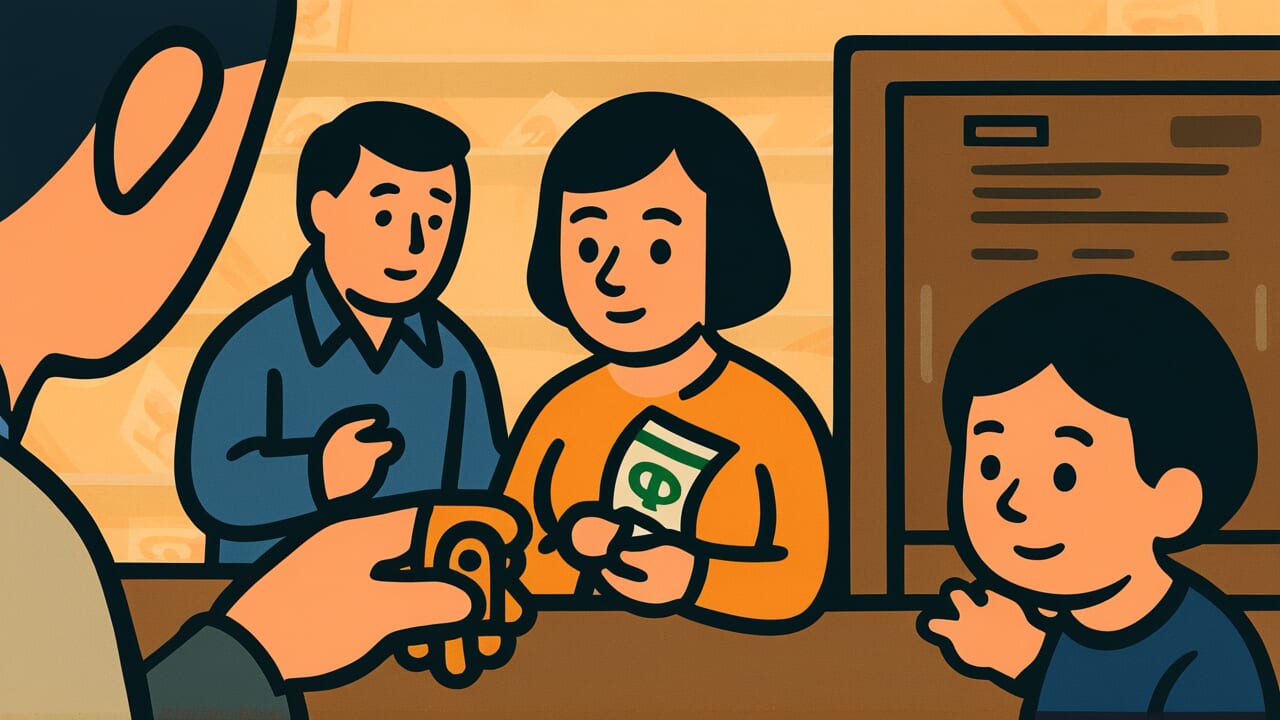How to Read “Don’t think parents and money will be there forever”
Itsumademo aru to omou na oya to kane
Meaning of “Don’t think parents and money will be there forever”
This proverb tells us a simple truth. Neither our parents’ love and presence nor our financial resources will last forever.
We often take these things for granted in daily life. We assume our parents will always be healthy and around. We think the money we have now will always be there.
But reality works differently. Parents will eventually grow old and pass away. Money gets spent and can disappear through unexpected events.
This saying helps us recognize what’s precious before we lose it. It teaches us to show gratitude to our parents while they’re still with us.
It reminds us to use our money wisely. Most importantly, it tells us to appreciate the happiness we often take for granted.
Even in modern society, this wisdom applies. We postpone spending time with our parents. We spend money carelessly because we have a steady income.
In these moments, this proverb serves as a wake-up call.
Origin and Etymology
The exact origin of this proverb remains unclear. However, people were already using it widely during the Edo period.
In that era, family bonds and economic stability formed the foundation of people’s lives.
The structure of this saying is interesting. It places “parents” and “money” side by side as parallel elements.
At first glance, these seem like different things. But they share a crucial similarity. Both are things we mistakenly assume will always be there.
Parents have been present since we were born, so their existence feels natural. Money in our wallet seems permanent if we don’t spend it.
This expression sharply captures this human psychology.
People in the Edo period lived with a close awareness of their parents’ aging and death. As the monetary economy developed, they also recognized the importance of managing money.
Against this backdrop, this saying was born. It served as a warning to young people and a reminder to oneself.
The phrase has good rhythm and is easy to remember. This helped it spread naturally through oral tradition.
Usage Examples
- I visit my parents every weekend, following the spirit of “Don’t think parents and money will be there forever,” so I won’t regret not seeing them more while they were healthy
- When I started spending carelessly after getting my bonus, my senior colleague reminded me: “Don’t think parents and money will be there forever”
Universal Wisdom
Humans have a tendency to believe that what exists today will continue forever. In psychology, this relates to “normalcy bias.”
Imagining change or loss creates psychological burden. So we unconsciously avoid thinking about it.
We especially take our parents’ presence for granted. They’ve been there since childhood, so we never question their permanence.
We turn away from the reality that our parents are aging. We tell ourselves “they’re still fine” or “I can visit anytime” and keep postponing.
The same applies to money. We assume the ten thousand yen we can spend today will still be available tomorrow. Without planning, we consume it carelessly.
This proverb has been passed down for hundreds of years. It endures because it accurately captures this universal human weakness.
People in every era have realized too late and felt regret. They passed down these words to prevent the next generation from repeating the same mistakes.
This shows deep understanding of human nature. People can only learn through experience. But through ancestral wisdom, we get a chance to realize things before actually losing them.
That’s the power of proverbs. This saying gently but firmly teaches us the importance of this very moment and the value of the happiness right in front of us.
When AI Hears This
The law of entropy increase is a universal principle. Like ink dropped in water that spreads on its own, ordered states inevitably move toward disorder when left alone.
The crucial point is that this change has directionality. It never reverses.
Consider the existence of parents. Life is a low-entropy state, a highly organized and ordered condition.
But with each cell division, copying errors accumulate in DNA. Proteins oxidize. Tissues gradually deteriorate.
Living things cannot completely prevent this even by taking in energy from outside. Using energy itself necessarily increases entropy.
Aging is a consequence of physical laws. The disappearance of parents as entities is not random chance but thermodynamic inevitability.
Money shows the same structure. Maintaining savings as an ordered state requires continuous external work.
Without action, inflation erodes value. Unexpected expenses occur. Assets dissipate.
There are countless pathways for money to decrease, but extremely limited pathways for it to increase. This is precisely the statistical nature of entropy.
This proverb expresses the irreversibility indicated by time’s arrow. It’s a physical insight expressed in everyday language.
Lessons for Today
This proverb teaches modern people about the weight of “now.” Your parents are aging one more day today, without fail.
The money in your account will definitely decrease when you spend it. This is an unavoidable fact.
But you don’t need to view this fact pessimistically. Rather, this is exactly why today shines so brightly.
When you know time with your parents is limited, today’s conversation becomes irreplaceable. When you understand money isn’t infinite, each yen you spend gains meaning.
Modern society is busy. We tend to postpone important things.
“I’ll do it next week.” “Next month is fine.” While we keep delaying, irretrievable time passes before we notice.
This proverb gently pushes our backs forward.
Why not call your parents today? Why not review this month’s expenses?
Small steps are enough. A life lived with awareness of limits becomes much richer than a life lived thoughtlessly.
It will be a life with fewer regrets.



Comments